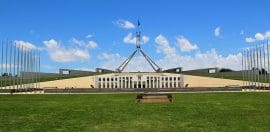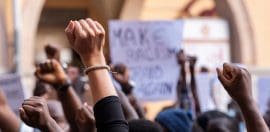People power prevails in face of great challenges

31 May 2021 at 5:14 pm
The annual CIVICUS report highlights the role of civil society and the challenges that lie ahead
Despite the pandemic-induced challenges of 2020, civil action demanding more just, equal, and sustainable societies led to breakthroughs in democracy and human rights across the globe, new research finds.
The latest report from global civil society alliance CIVICUS, found that globally, countries failed the pandemic stress test, with many institutions and methods of governance not up to scratch.
But civil society stepped up to the challenge of holding governments to account by providing services and defending human rights on the front line.
Josef Benedict, CIVICUS civic space research officer, told Pro Bono News that many governments had failed vulnerable citizens by failing to put adequate safety nets in place and in some cases had introduced civil restrictions that had little to do with the pandemic.
“Without civil society, people’s experiences of the pandemic would have been a lot worse,” Benedict said.
The role and importance of protesting in 2020
While protests across the globe looked a little different in 2020, the report said that the impact of these events was profound.
The resurgence of demands for racial justice and an end to police brutality under the Black Lives Matter banner made headlines and travelled from the United States, to countries as diverse as Colombia, the Netherlands and South Africa.
The report also noted the significance of civil action such as the Indian farmers strike, civil disobedience against the military uprising in Myanmar, and pro-democracy protests in Hong Kong, Belarus and Algeria throughout the year, with civilians throwing themselves in the way of authorities to demand freedoms.
Benedict said that with so many political systems dominated by elites and failing to speak to people’s needs, protesting was often the default way that people can make their voices heard and seek change.
“Protesting works – here globally we can attest to the climate and Black Lives Matter movements changing agendas, Chile’s movement towards a new constitution, Argentina’s legalisation of abortion,” he said.
“Positive changes like these are why protest rights should be respected. Of course because protest works, we get backlash from political and economic elites who don’t want to share power.”
Australia remains on watch
With 87 per cent of the world’s population now living in countries rated as “closed”, “repressed” or “obstructed” by the CIVICUS Monitor (an increase of over 4 per cent from 2019), Australia’s civic space is relatively positive.
This is despite CIVICUS downgrading Australia’s rating from “open” to “narrowed” in 2019 due to incursions on free speech, attacks on press freedom, attempts to silence whistle-blowers, and the vilification of environmental activism by politicians.
Read more: Smear campaign against green activists, anti-protest laws and media restrictions in Australia
This rating did not change at the end of 2020, and Benedict said that while CIVICUS welcomed commitments to undertake press freedom reforms and review whistleblower laws, more was needed to protect and strengthen civil freedoms.
“We are concerned about the ongoing prosecution of the lawyer of whistle-blower Witness K who is being prosecuted under the Intelligence Services Act for disclosing information about the bugging of Timor-Leste government buildings in 2004 by the Australian government,” he said.
He also expressed concern over the Australian Security Intelligence Organisation Bill 2020, which was rushed through parliament at the end of 2020 without adequate scrutiny.
The bill, which grants powers such as the ability to interrogate and detain children as young as 14 years, has drawn criticism from groups such as the Australian Human Rights Commission who say it should be redrafted to amend ASIO’s powers and to include stronger oversight and other human rights safeguards.
And as momentum builds towards the COP26 United Nations climate change conference, Benedict said that a further resurgence of climate action will be something to watch, particularly in Australia, where the tensions between fossil fuels and climate impacts are already strong.
Challenges in years to come
Despite the advocacy wins and important role of civil society organisations over the past year, the report warned that civil freedoms continued to deteriorate across the world, with significant civic space restrictions continuing to increase year on year.
“Our data shows that the detention of protesters and the excessive use of force against them are the most common tactics being used by governing authorities to restrict the right to peaceful assembly,” Benedict said.
“This is not a new trend but what has changed in 2020-21 is that multiple governments are using the pandemic as an excuse to restrict democratic activities and challenge civic freedoms.”
The report found that issues of censorship are increasing across the globe, with governments blocking websites and social media posts, targeting media outlets and journalists and using legislation to criminalise speech under the guise of preventing the dissemination of “fake news”.
Some governments used the pandemic as an opportunity to silence critical voices about the unfolding disaster.
The report called on states to respect human rights and democratic freedoms, and listen to the voices of protestors.
“The great current wave of protests is sure to continue,” the report said.
“People are brave to protest, but they should not have to do so at the risk of being thrown behind bars, or facing brutal, even lethal, violence.”
If you’re interested in finding out more about the role of the civic space and the threats it is facing in modern times, tune into Pro Bono Australia’s upcoming webinar, “Rethinking Civil Society in Uncertain Times” on 10 June. Register for the event here.







